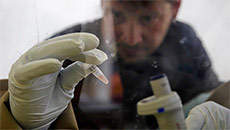Connecting the dots between sun exposure and skin cancers, a study says that a genetic mutation caused by ultraviolet (UV) light is likely to be the driving force behind millions of human skin cancers.
The mutation occurs in a gene called KNSTRN, which is involved in helping cells divide their DNA equally during cell division.
Genes that cause cancer when mutated are known as oncogenes.
"This previously unknown oncogene is activated by sunlight and drives the development of cutaneous squamous cell carcinomas," said senior study author Paul Khavari, a professor from the Stanford University School of Medicine in the US.
Cutaneous squamous cell carcinoma is the second most common cancer in humans.
"Our research shows that skin cancers arise differently from other cancers and that a single mutation can cause genomic catastrophe," Khavari noted.
The researchers made the discovery while investigating the genetic causes of cutaneous squamous cell carcinoma.
They compared the DNA sequences of genes from the tumour cells with those of normal skin and looked for mutations that occurred only in the tumours.
The researchers found the UV induced KNSTRN mutation leads to 20 percent of actinic keratoses - a premalignant skin condition that often progresses to squamous cell carcinoma.
But they did not find the mutation in 122 samples of normal skin, indicating the mutation is likely to be an early event in the development of the skin cancer.
The identification of a new oncogene will allow researchers to better understand how these types of skin cancers develop.
"It is critical to protect the skin from the sun," Khavari noted.
The study appeared online in the journal Nature Genetics.





